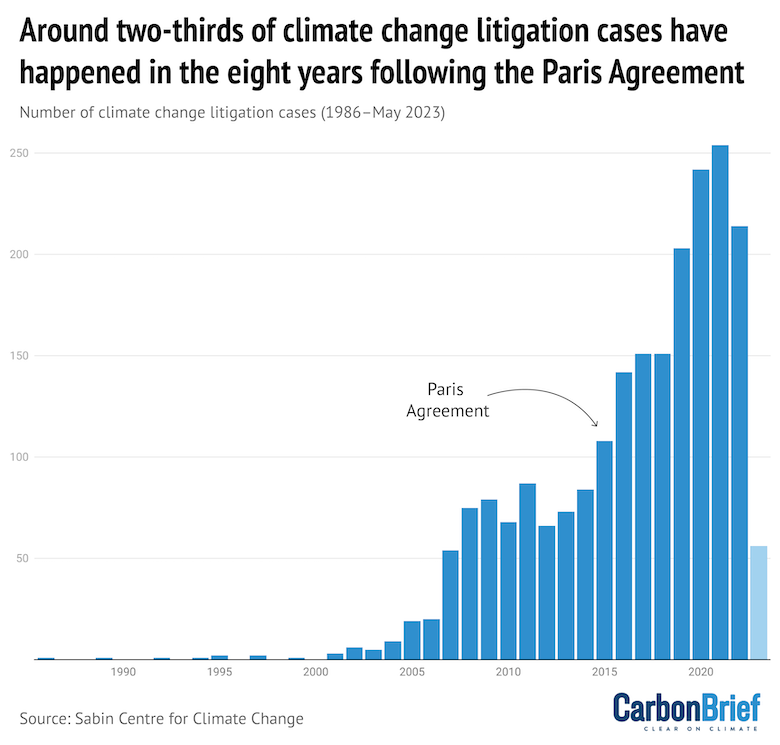
DeBriefed 7 July 2023: World’s run of hottest days; Shipping’s climate reckoning; Revival for climate misinformation
Joe Goodman
07.07.23Joe Goodman
07.07.2023 | 2:34pmWelcome to Carbon Brief’s DeBriefed.
An essential guide to the week’s key developments relating to climate change.
This is an online version of Carbon Brief’s weekly DeBriefed email newsletter. Subscribe for free here.
This week
Hottest hat-trick
BREAKING RECORDS: The record for the world’s hottest day was broken three times this week. On Monday, average global temperatures reached a record 17.01C, the Associated Press reported. Tuesday and Wednesday saw temperatures of 17.18C recorded, according to the newswire. Then, on Thursday, global temperatures reached a new high of 17.23C, noted AP.
120,000 YEARS: The new records, however, could soon be broken again, scientists told the Guardian. Dr Karsten Haustein, a climate scientist at the University of Leipzig, told the outlet: “The coming days will probably see a small downturn, but, since the annual global temperature maximum is at the end of July, more days are likely to be warmer than yesterday…Chances are that the month of July will be the warmest ever and, with it, the hottest month ever: ‘ever’ meaning since the Eemian which is some 120,000 years ago.”
ON THE GROUND: The impacts of the record heat have been felt around the world. Above-average temperatures were recorded in countries including India, Iran and Canada, while extreme heat in Mexico killed more than 100 and Beijing recorded its hottest ever June, Reuters reported. On Thursday, Africa recorded its hottest night ever, when temperatures did not drop below 39.6C in Adrar, Algeria, according to a tweet by atmospheric science student Colin McCarthy. It comes as Nigeria began preparations for another round of deadly flooding, the Nigerian outlet Vanguard reported.
Shipping’s climate reckoning
‘BY OR AROUND’: The global shipping industry has agreed to reach net-zero emissions “by or around 2050” after a week of testy talks, BBC News reported. As Carbon Brief’s policy correspondent Josh Gabbatiss noted earlier today in a string of tweets from the site of the negotiations in London, the deal commits the shipping industry to a series of decadal targets: 20% reduction on 2008 levels by 2030 (but “striving” for 30%); 30% by 2040 (but “striving” for 70%); and 80% by 2050 (but “striving” for “close to net-zero”).
EMISSIONS GIANT: The deal was agreed by the 175 member states of the UN’s International Maritime Organisation. Some 90% of global products and goods travel by ship, making the industry accountable for 3% of global emissions. This is roughly equivalent to the emissions of Germany and more than the entire aviation industry.
NOT 1.5C ALIGNED: “Almost all” member states were happy with the outcome agreed in London, according to Josh’s reporting. However, a quick-fire analysis of the deal by the International Council on Transport said the new targets are not compatible with the Paris Agreement’s aim to keep global temperature rise to 1.5C by 2100, although they could be compatible with limiting warming to 2C.
Around the world
REVOKING FINANCE: A “leaked briefing note” to ministers, first seen by the Guardian, suggested that the UK government is “drawing up plans” to “drop” the nation’s £11.6bn international climate finance pledge. The government denied the story.
SHELLED: Shell CEO Wael Sawan’s warning against cutting oil and gas production has been dubbed “irresponsible” by the head of the UN’s climate change body Simon Stiell, reported Reuters.
BLACK AND GREEN: The United Arab Emirates (UAE) aims to triple the contribution of renewables to the country’s energy mix over the next seven years with 200bn dirhams ($54.4bn) worth of investment, according to the Saudi Arabia-based website Arab News.
GREEN HYDROGEN: India is looking to sign bilateral agreements with the EU, Singapore and Japan “to allow them to use carbon credits linked to green hydrogen production in India in exchange for investment and purchase deals”, Reuters reported.
€700bn
The amount of money the EU will need to spend every year in addition to current climate finance if it is to “green” the economy and cut out “cheap” Russian fossil fuels, according to a draft report from the bloc’s executive arm, Bloomberg reported.
Latest climate research
- Rising temperatures are causing methane from below the surface in the Arctic to escape through groundwater springs, new research in Nature Geoscience found. The researchers examined 78 areas in Svalbard.
- Using tree ring data from a site in Bosnia and Herzegovina, researchers found that human-caused warming has exacerbated droughts in southern Europe since the 1850s, according to a study in Communications Earth and Environment.
- Each 1C rise in maximum temperature in Bangladesh has driven a 4.6% rise in hospitalisations for diarrhoea in children under 5 years old, research in the International Journal of Environmental Research and Public Health found.
Captured
Climate cases on the rise

Exactly 2,341 climate change litigation cases have been filed since 1986, according to a database maintained by the Sabin Centre for Climate Change. Two-thirds of these have been since 2015, the year of the landmark Paris Agreement on climate change – and 190 were in the past 12 months alone, according to a study by the Grantham Research Institute on Climate Change and the Environment released in June. According to the analysis, more than 50% of cases have direct judicial outcomes that can be understood as “favourable” to climate action, while many more have indirect impacts outside the courtroom.
Spotlight
Is climate misinformation making a comeback?

Carbon Brief speaks to Jennie King, head of climate research and policy at the Institute of Strategic Dialogue (ISD), about the revival of online climate misinformation ahead of the next round of UN climate talks. The interview has been edited for clarity and length.
Carbon Brief: How has the climate misinformation landscape changed over the past five years?
Jennie King: Around the time of COP26 [in 2021] there had been an assumption that the traditional forms of denialism, which had been circulating since the 1970s, had really been confined now to the margins of public life. There was no longer the same kind of social licence for saying things like “climate change doesn’t exist” in polite society, or certainly in legacy media.
What’s been interesting to see over the past 12 to 18 months, however, is that denialism is making a real comeback, but in a way that is framed for the current conspiratorial universe. So rather than “don’t trust the science”, it is much more “don’t trust the scientists”. It is much harder to tackle because it’s not grounded in the idea that there isn’t an evidence base or that climate modelling is unreliable. It’s much more a reflection of a wholesale erosion of trust in institutions.
CB: What are the challenges facing combating climate change misinformation today?
JK: The challenge with combating any type of misinformation is that, usually, the bad content is much better at gaining virality than the good content. If social media companies are optimising their business model for engagement as a means for advertising revenue, you are always going to create a dynamic that biases towards incendiary content and – in the worst cases – hateful and extremist content.
CB: You ran an intelligence unit “war room” at COP26 and COP27, using big data to monitor online discourse at the summit in real time. What did you find?
JK: In 2021, we spent a huge amount of time coding keyword lists to monitor what people were saying about Article 6 [of the Paris Agreement] and loss and damage. The reality is you get almost no posts being pulled through about the substance of negotiations. Almost everything that is gaining a critical mass of exposure around these key events sits much more squarely in the cultural space. In 2021 and 2022, we consistently found the weaponisation of climate as a general topic, pushback on the so-called “woke agenda” and the discrediting of elites and those who are involved in the negotiations around COP.
CB: What will you be looking out for at COP28 in November?
In particular, this year, we are interested in sophisticated and potentially state-sponsored disinformation campaigns coming from petrochemical states, including the host country, the UAE. We think that is not necessarily going to be traditional forms of disinformation in the sense of lying about the reliability of solar and wind energy, but is likely to be subtler forms of greenwashing and muddying the waters. This might be in terms of positing certain companies or certain countries as leaders and innovators in tackling the issue of climate change – and, therefore, pivoting the conversation away from key aspects of discussion such as the phase-out of fossil fuels.
Watch, read, listen
WHO INVENTED CLIMATE DENIAL?: In this Origin Story podcast, i newspaper columnist Ian Dunt and journalist Dorian Lynskey explored the origins of climate change denial.
MBERA FIRE BRIGADE: A group of Malian refugees battle relentless bushfires – protecting their camp, their livelihood, and Mauritian locals – in a short documentary by David Alexander for the New Yorker.
ENVIRONMENTAL RACISM: This episode of the Ballpark podcast from the London School of Economics examined how environmental racism manifests and how urban development has contributed to this problem.
Coming up
- 10-19 July: High-Level Political Forum on Sustainable Development, New York
- 10-28 July: 2nd Part of the 28th Annual Session of the International Seabed Authority, Kingston, Jamaica
- 12 July: Reducing emissions: Progress Report to Parliament 2023 – Live Q&A, UK Climate Change Committee, online
- 12 July: IEA Tracking Clean Energy Progress 2023 Report Launch, online
- 12 July: IEA Critical Minerals Market Review 2023 Report Launch, online
- 13-14 July: Ministerial on Climate Action (MOCA), Brussels
Pick of the jobs
- Covering Climate Now is hiring a director of training | Salary: $110,000-$135,000. Location: Remote
- India’s Centre for Science and Environment is hiring a programme officer for climate change | Salary: Competitive. Location: Delhi
- The US Pulitzer Center is hiring for a program coordinator, environmental investigations | Salary: $43,000-$48,000. Location: Remote, Washington DC
- The Grantham Institute for Climate Change at Imperial College London is hiring a research associate in the analysis and interpretation of climate data for extreme weather | Salary: £43,093-£50,834. Location: London, hybrid
- The Boston Globe is recruiting a climate science editor | Salary: Unknown. Location: Boston
DeBriefed is written in rotation by Carbon Brief’s team and edited by Daisy Dunne. Please send any tips or feedback to [email protected]
-
DeBriefed 7 July 2023: World’s run of hottest days; Shipping’s climate reckoning; Revival for climate misinformation



